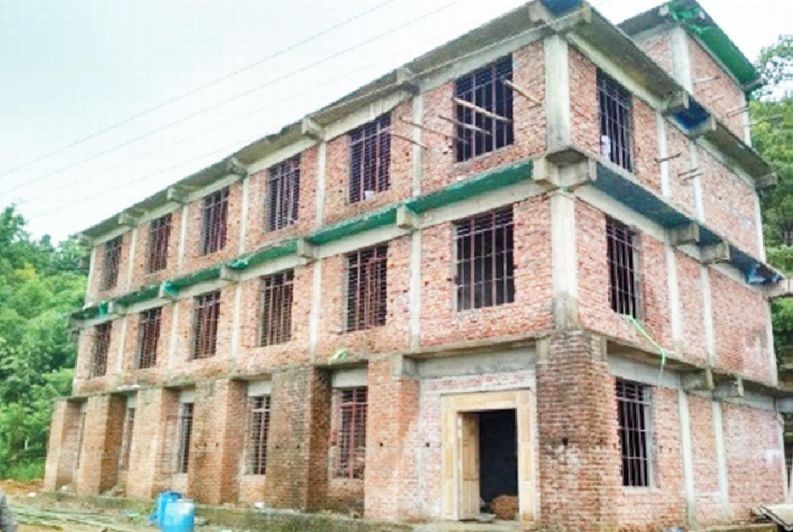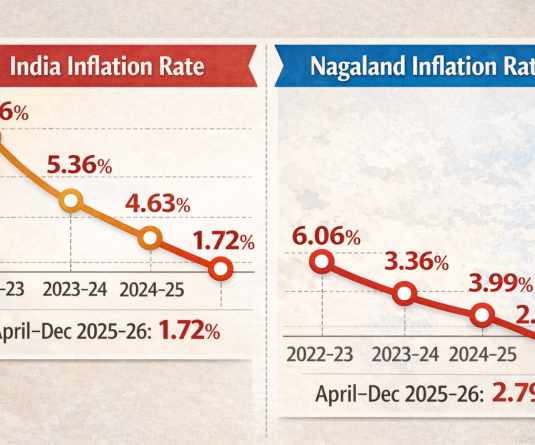Wakching New Model College, Mon was sanctioned in October 2014 under Rashtriya Uchchatar Shiksha Abhiyan (RUSA). During April to July 2015, nine work orders for Rs 8.14 crore was awarded for completion within 36 months from the date of issue of the work order. While full payment was released to contractor of certifying completion of civil works, during a joint verification in September 2019, the audit noticed that the project is yet to be completed as depicted in the picture. The Administrative and Academic Blocks of project, incidentally, was digitally inaugurated by Prime Minister of India on February 3, 2019 from Srinagar, Jammu & Kashmir. (Photo Courtesy: CAG)

Flags delays, lack of monitoring, quality control and safety measures
Moa Jamir
Dimapur | August 12
Can the Nagaland Public Works Department (Housing) “entrusted with the responsibility of creating residential and non-residential infrastructure in the State” be ‘trusted’ to build robust and safe buildings?
Apparently not, or at least, not those built before 2019, if one goes by the recent ‘Performance Audit on Construction and Maintenance of Government buildings by PWD (Housing)’ undertaken by the Comptroller and Auditor General (CAG) of India.
The audit was part of the CAG’s Report on “General, Economic and Revenue Sectors for the year ended 31 March 2019 (Report No.2 of 2020), Government of Nagaland” tabled in the State Assembly on August 5.
The audit examined 199 projects covering the offices of Chief Engineer (Housing), all 7 Housing Divisions (37 projects) and 9 out of 17 engineering divisions (82 projects) attached with other departments. Conducted during June to September 2019, the projects sanctioned during 2014-2019 period were selected through stratified sampling method.
The report presented to the State Legislature, among others, flagged various issues concerning safety, quality as well as execution of the projects.
No monitoring; quality control board in limbo
According the CAG, Rule 68 of NPWD code stipulated that the Chief Engineer (CE) as the Head of the Department is responsible for the efficient administration and general professional control of public works within its jurisdiction, while Rule 77 assigned the Superintending Engineer (SE) to inspect the various works in progress for ensuring “efficient and economical” system of management.
None of the divisions had furnished records on the inspection of projects under their jurisdictions, either by the SE or other officials on the former’s behalf, the CAG highlighted.
The site accounts maintained by the executing divisions, it noted, also did not indicate any monitoring or quality checks by the SEs, leading the CAG to comment that there was no assurance that the CE or SEs discharged their duties assigned.
Meanwhile, the audit revealed that while the PWD (Works & Housing) had notified the setting up of State Quality Control Board on March 18, 2011, it was in a limbo.
The Board, among others, is empowered to inspect any government project or construction work being undertaken in the State and to ensure that the qualities of materials being used or supplied are in accordance with specification.
Examination of records of CE (H) and 16 divisions revealed that no quality control checks or inspections were undertaken by the Board during the execution of the projects from 2014-19, the CAG stated.
Nagaland is yet to establish any laboratory for undertaking quality test of construction materials indicating weak quality control mechanism, which may result in compromising with quality, it observed.
As per the CAG, the Department in its reply stated that the Board could not do the mandatory “checks due to absence of supporting staff and laboratory.”
Fire safety in just 1 out of 69 major projects
With absence of monitoring and quality control, fire safety measures were found missing most Detailed Project Reports (DPRs) of 119 projects examined, which included 69 major projects like offices, schools, hospitals, market complex, multi-parking etc.
Provisions for fire-fighting works was made only in 1 DPR, the CAG pointed out.
‘Alarmingly,’ emergency exits were also not made in any of the 69 major projects.
The Department in its reply in December 2019 maintained that, for new projects, safety measures like “firefighting, emergency exit etc. are taken into consideration while designing/ preparing DPRs.”
Overall findings
As per the CAG, during 2014-2019 period, the State Government sanctioned 254 new projects of residential and non-residential buildings at a cost of Rs 671.95 crore and released Rs 744.66 crore (including spill over release during 2014-19). The reported expenditure was Rs 683.72 crore, leaving an unspent balance of Rs 60.94 crore.
Out of 119 projects analyzed, 77 projects or 65% were found incomplete at the time of audit.
The CAG also observed that work orders in four projects at an estimated cost of Rs 77.99 crore were issued to contractors before settlement of land issues while in two other ‘important projects,’ with an estimated cost of Rs 211.91 crore, land was handed over to the contractors after delay ranging from 7-37 months.
This resulted in delay in commencement and completion of projects with avoidable cost escalation, it said. Overall, 90 projects could not complete on time due to delays in handing over land/ site and funding, it said.
Again, four projects above Rs 5 crore each under 4 divisions were not found to be approved by the Empowered Committee, in violation of existing provisions while in two divisions, advance payment of Rs 17.15 crore was made to contractors without “enabling clause in the agreement” and securing “any lien” on the materials brought to site.
In case of the former, the Department gave reply for two while did not give any explanation for the rest. In the latter case, while Rs 8.56 crore was found adjusted through running account bills during the audit; out of the remaining amount (Rs 8.59 crore), Rs 2.49 crore have been recovered while Rs 6.10 crore unadjusted would be recovered in the subsequent running bills, the Department informed the CAG in December 2019.
“The practice of giving advance payment should be stopped, henceforth, the CAG said.
“Examination of records and joint physical verification of works revealed short execution of 72 items of works in 40 projects costing Rs 2.60 crore,” the CAG said. A total of 315 items of works, costing Rs 9.09 crore recorded in the Measurement Books, “were not actually executed, resulting in irregular and excess payment of Rs 11.69 crore to contractors,” it added.
Recommendations
In its recommendations, the CAG advocated for initiating action against erring officials for irregularities committed in works by the Department.
It also asked the Government to ensure that detailed estimates for projects are prepared after detailed survey of topography and site condition.
Ensure possession of land before award of work to contractors and hand over sites for commencement of works in time, it underscored.
It further called for timely funding of projects for completion of the projects within the “stipulated time frame and approved cost.”
Ensure that the monitoring of projects is done by the designated Authorities for timely completion and quality control, it said.
Besides setting up a quality control laboratory for testing of materials, the CAG also recommended the Department to ensure provision of fire safety measures in all projects of the Government.





